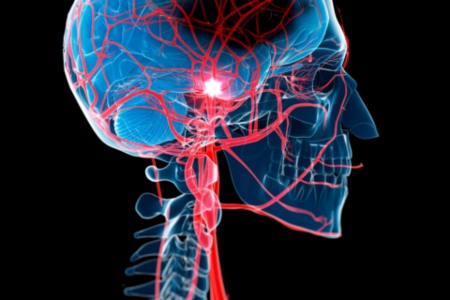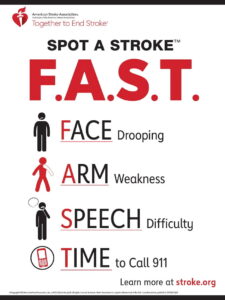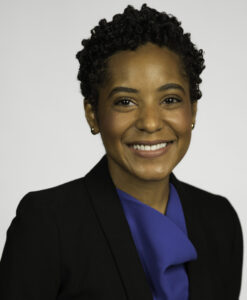May is Stroke Awareness Month
 A stroke is a serious medical condition that occurs when the blood supply to part of the brain is interrupted or reduced. It can happen to anyone, at any age. In fact, stroke is a leading cause of death and long-term disability in the United States. But the good news is that there are steps you can take to reduce your risk of having a stroke.
A stroke is a serious medical condition that occurs when the blood supply to part of the brain is interrupted or reduced. It can happen to anyone, at any age. In fact, stroke is a leading cause of death and long-term disability in the United States. But the good news is that there are steps you can take to reduce your risk of having a stroke.
What is a stroke?
According to the CDC, a stroke occurs when the blood supply to part of the brain is interrupted or reduced. This can happen for two main reasons: a clot that blocks blood flow to the brain (ischemic stroke), or a blood vessel that ruptures and causes bleeding in the brain (hemorrhagic stroke). When the brain doesn’t receive enough oxygen and nutrients from the blood, brain cells start to die. This can cause lasting brain damage, long-term disability, and even death.
What are the signs of a stroke?
 It is important to recognize the signs of a stroke so that you can get medical help as soon as possible. Remember the acronym “FAST”:
It is important to recognize the signs of a stroke so that you can get medical help as soon as possible. Remember the acronym “FAST”:
- Face drooping
- Arm weakness
- Speech difficulty
- Time to call 911
If you or someone you know experiences any of these symptoms, call 911 immediately.
The sooner you get help, the better your chances are for a full recovery.
For selective patients with ischemic strokes, certain medications or procedures can be used to aid in the removal of a stroke-causing clot.
“Typically, these interventions can only be used within a few hours of initial stroke symptoms, so it is best to call 911 immediately if you or someone you know show signs of a stroke,” stresses Brevard Health Alliance provider Dr. Nicholette Fox, MD. “Those who received such interventions early on after having a stroke have better outcomes than those who received them later.”
Despite such interventions, stroke prevention is the best way to reduce the burden of stroke.
What are some of the risk factors associated with stroke?
- Nonmodifiable risk factors (things we cannot control)
- Older age
- Ethnicity – Blacks and some Hispanic/Latino Americans, and American Indians have higher risk of stroke
- Genetics
- Modifiable risk factors (things we can control)
- High blood pressure
- Diabetes
- High cholesterol
- Cigarette smoking
When should I talk to my provider about my risk for stroke?
“It is always a good time to speak with your provider about your stroke risk,” explains Dr. Fox, “so that he or she can counsel you on ways to reduce your stroke risk. It is particularly important to speak with your provider if you have any of the known risk factors for stroke, such as cigarette smoking, hypertension, elevated cholesterol, or diabetes. This way, your provider can work with you on reducing your risk.”
How can I reduce my risk of stroke?
There are several things you can do to reduce your risk of stroke:
- Manage your blood pressure: High blood pressure is the single most important risk factor for stroke. Get your blood pressure checked regularly and take steps to keep it under control.
- Quit smoking: Smoking can damage your blood vessels and make them more likely to narrow or rupture. If you smoke, quitting is one of the best things you can do for your health.
- Eat a healthy diet: A diet rich in fruits, vegetables, low in salt and saturated fats can help you maintain a healthy weight and reduce your risk of stroke. Examples include the Mediterranean diet, DASH diet, or a whole foods plant based diet
- Exercise regularly: Physical activity can help you maintain a healthy weight, lower your blood pressure, and reduce your risk of stroke.
- Control your cholesterol: High cholesterol levels can contribute to the buildup of plaque in your arteries, which can increase your risk of stroke. Talk to your doctor about ways to manage your cholesterol levels.
- Reduction of alcohol intake: No more than 2 drinks per day for men, and no more than 1 drink per day for women
What should I do if I have a stroke?
If you think you may be having a stroke, call 911 immediately. Every minute counts, so don’t wait to see if your symptoms go away. Getting prompt medical attention can make a big difference in your chances for recovery.
In summary, stroke is a serious medical condition that can have long-lasting effects on your health and quality of life. By taking steps to manage your blood pressure, quit smoking, eat a healthy diet, exercise regularly, and control your cholesterol, you can reduce your risk of stroke. And by recognizing the signs of a stroke and getting medical attention quickly, you can help improve your chances for a full recovery. To talk to a provider about your stroke risk, call or text Brevard Health Alliance at 321-241-6800 today.

Dr. Nicholette Fox is a physician in Family Medicine for Brevard Health Alliance and practices at our Rockledge/Barton clinic.

















































































































































